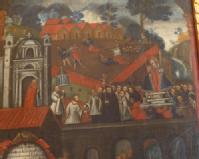Calendar
Seminar: Dr Gabriela Ramos: The South American Epidemic of 1720: a historical conundrum
A research seminar with Dr Gabirela Ramos of University of Cambridge. Refreshments will be served. All are welcome.
Abstract
It is widely accepted among historians that Old World disease explains the severe population losses experienced in South America in the sixteenth century. Although epidemics and disease during the early colonial period have proven difficult to investigate due to the paucity of sources, we count on plausible studies describing the demographic debacle following European arrival. Even though health and living conditions did not improve in the following decades, population historians have suggested that the eighteenth century witnessed a recovery of the regions’ indigenous population, with some scholars —following governmental reports— suggesting that population recovery took off in the late seventeenth century. The eighteenth century population recovery was soon severely disturbed by what appears to have been the gravest epidemic to hit the region since the early colonial period. Although information on this period is evidently more substantial than two centuries earlier, the characteristics of the 1720 epidemic are difficult to grasp. We know that the disease struck a considerable area, including the cities of Buenos Aires, Potosí, Cuzco, Arequipa, and extensive parts of the Lima diocese. Extant accounts suggest that between 1717 and 1722 the epidemic took tenths of thousands of lives. As with similar events, available accounts are disparate and hard to pin down. The way the historiography has reported on the epidemic adds to the challenges involved in its study. This paper discusses the difficulties involved in researching and understanding this phenomenon.

